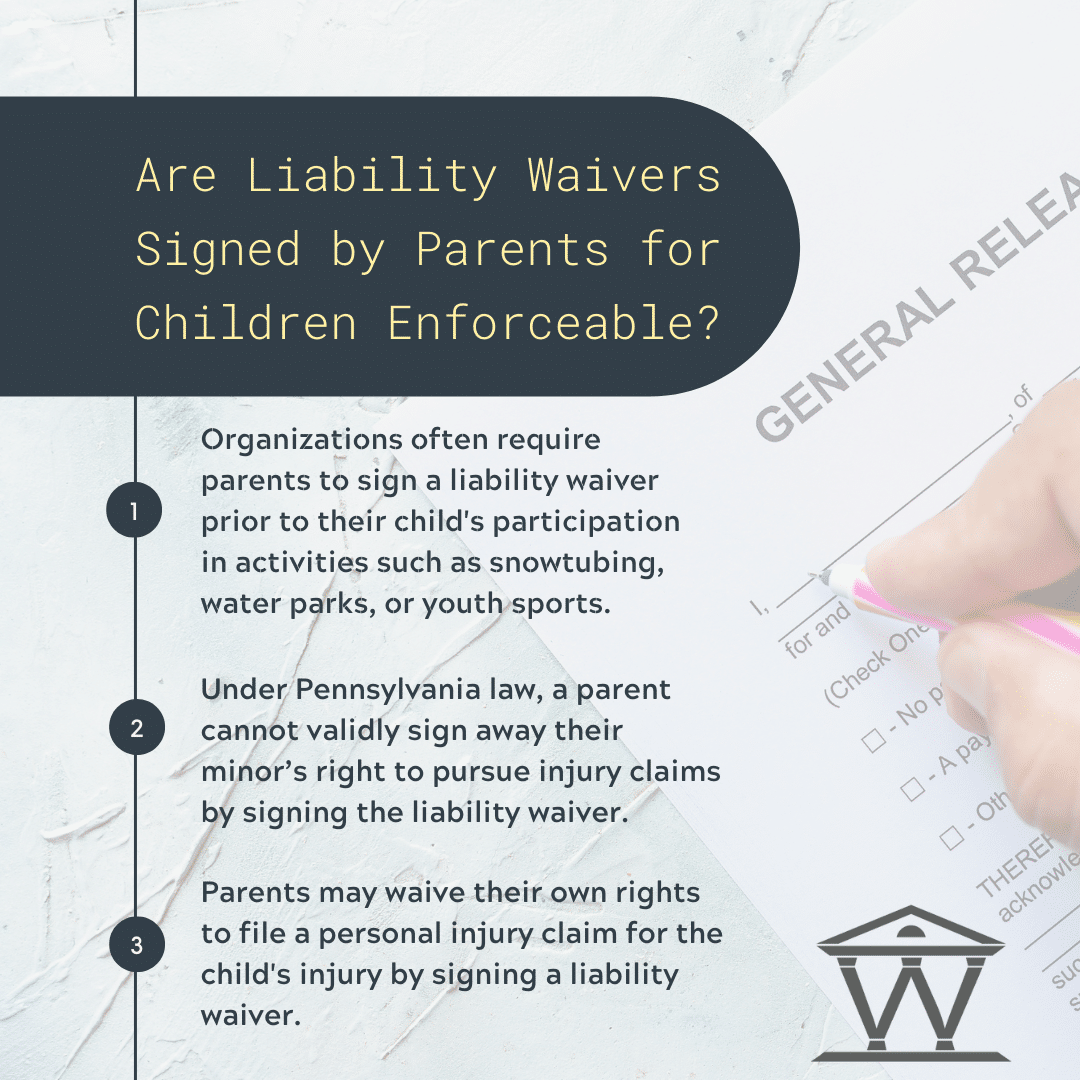 Philadelphia child injury lawyers understand that parents often have questions regarding liability waivers for children’s activities. Many recreational activities for children, such as trampoline parks, water slide parks, snow tubing and skiing slopes, and even youth sports organizations require the parent to sign a liability waiver for their child to participate. Parents are often pushed to sign a liability waiver without the opportunity to carefully review its contents. Philadelphia child injury lawyers examine whether these documents are enforceable in Pennsylvania and make recommendations about how parents should handle these scenarios.
Philadelphia child injury lawyers understand that parents often have questions regarding liability waivers for children’s activities. Many recreational activities for children, such as trampoline parks, water slide parks, snow tubing and skiing slopes, and even youth sports organizations require the parent to sign a liability waiver for their child to participate. Parents are often pushed to sign a liability waiver without the opportunity to carefully review its contents. Philadelphia child injury lawyers examine whether these documents are enforceable in Pennsylvania and make recommendations about how parents should handle these scenarios.
Under Pennsylvania law personal injury to a minor gives rise to two separate and distinct causes of action, one the parents’ claim for medical expenses and loss of the minor’s services during minority, the other the minor’s claim for pain and suffering and for losses during the age of majority.
Pennsylvania law asserts that a valid release, such as a liability waiver, is a bar to recovery for the matters cited in the release. Only the presence of fraud, accidental means, or incompetency by the signing party may allow the release to be cast aside.
However, Pennsylvania courts have found that a parental relationship does not provide authority for a parent to release the claims or potential claims of a minor. This is supported by case law in Simmons v. Parkette Nat’l Gymnastic Training Center and Shaner v. State Sys. Of Higher Educ.
In Shaner v. State Sys. Of Higher Edu., the court found that a mother could not release her minor child’s personal injury claims related to injuries she sustained during softball camp based on being her parent.
In Simmons v. Parkette Nat’l Gymnastic Training Center, the courts found that the adult plaintiff was unable to pursue a personal claim for damages for her daughter’s injuries at a gymnastic program after signing a release and indemnity agreement. However, courts found differently on behalf of the minor child who also signed the agreement. According to Philadelphia child injury lawyers, when a minor executes a contract, the agreement is not “void,” but it is “voidable.” This means that the child, after reaching the age of majority, may disaffirm the contract rendering it null and void. In Pennsylvania, the age of majority is generally 18 years old, unless otherwise provided by law.
In summary, Pennsylvania law does not allow a parent to sign away their minor child’s personal injury claim based on a parental relationship; however, the parent may relinquish their own personal rights to a file a personal injury claim for the child’s injury.
Philadelphia child injury lawyers recommend closely scrutinizing any liability waiver or release form prior to signing it. You should consider having the release reviewed by an attorney prior to signing. Sometimes, the most cautious option is to avoid the activity all together.
If your child was injured due to another person’s negligence or reckless behavior, you may be able to file a child injury lawsuit to seek compensation for damages. It may be possible to file a claim even if a liability waiver was signed; speak to Philadelphia child accident injury lawyers for advice on your specific case.
Some common child injury lawsuits include:
Philadelphia child injury lawyers can seek financial compensation for damages by filing a child injury lawsuit. A child who suffers serious injury will often incur significant medical bills for their care. Some children may need supportive care services for permanent disabilities or may need specialized durable medical equipment to aide in their recovery. The Wieand Law Firm has extensive experience representing victims of negligence.
Personal Injury Lawyers Philadelphia PA at the Wieand Law Firm can help families when a negligent or reckless act results in a child injury. Our caring and compassionate lawyers offer a free consultation to review your case and discuss your legal options. We seek to aggressively represent families during their time of need to obtain the best possible outcome for their case. Call 215-666-7777 today or send a message via the online form to speak directly with one of our attorneys.